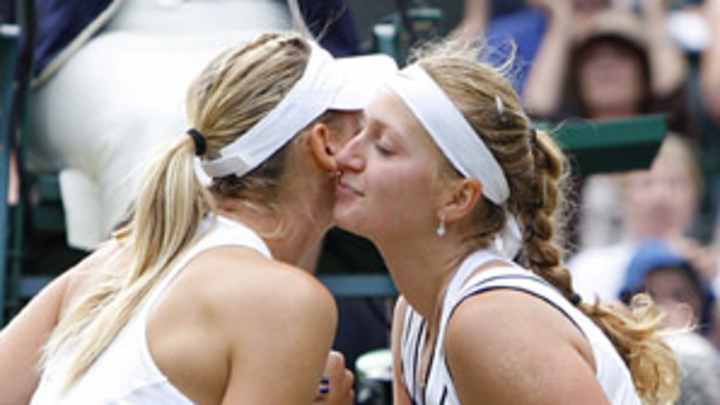Kvitova dominates Sharapova to provide glimpse into the future

WIMBLEDON, England -- It may well be said that Petra Kvitova represented the new generation of women's tennis as she took the Wimbledon title on Saturday, 6-3, 6-4 over Maria Sharapova, but that wouldn't be correct. She entered the Centre Court arena alone, with a brand of skill and confidence all her own. It's doubtful that any of her young contemporaries could have stood up to the moment so brilliantly.
They all play shockingly powerful tennis, and they all have their moments, but Kvitota is the one who stared down Maria Sharapova in the final at Wimbledon. So many times, Sharapova seemed on the verge of taking psychological command of this match. There were times when a nervous-looking Kvitova handed over a few choice gifts. But in the end, the strokes and the steely mental attitude belonged to a 21-year-old from the Czech Republic, new to the Grand Slam winner's circle and likely to repeat the feeling throughout her career.
The first hint of intrigue arrived when Kvitova, leading 3-2 in the first set, watched a pair of Sharapova double-faults hand her a service break. It was a terrible sign for Sharapova, whose serving problems are very well documented, but this familiar flaw didn't cost her in the end. She wound up serving well, routinely nailing her first serves as the match progressed and applying constant pressure.
A bigger problem, for Sharapova, was her opponent's brazen approach and sheer power.
Kvitova held strongly for 5-2, Sharapova resorting to a lunging left-handed shot as she sprinted in pursuit of an overhead. The game ended on one of Kvitova's calling cards, the one executed so well by fellow left-handers John McEnroe and Martina Navratilova in the past: a huge first serve, way out wide, from the ad court.
The beauty of Kvitova's victory is that she mixed things up, at least when it came to the serve. Even with that obvious ad-court weapon, she often went straight at Sharapova's body, forcing some awkward returns and putting some doubt in Maria's mind.
Despite her third double-fault in a row, Sharapova managed to hold for 5-3, but Kvitova served out the first set at love. And when she rushed to a 2-0 lead in the second set, spectators wondered if she just might turn this into a rout, as in one of her early-round matches.
With Sharapova in the mix, such thoughts never stay present for long. She hit a fabulous shot in breaking Kvitova for 2-2, a retreating backhand off an overhead smash that turned into a perfect, inadvertent lob, and for the first time all afternoon, Sharapova's fiancée, New Jersey Nets guard Sasha Vujacic, unleashed a torrent of shouts and fist-pumps from the Friends Box.
Kvitova's worst moments came in the sixth game, when Sharapova broke again to get even at 3-3. With virtually the entire court at her disposal, she botched an easy backhand. And at deuce, gauging an absolute sitter forehand near the net's left corner, she inexplicably went for a radical cross-court angle and missed.
At that point, who didn't think the kid's nerves had finally come into play? Wouldn't Sharapova seize that moment and never look back? Not at all. She had problems with the accuracy of her groundstrokes all day, and she badly scattered a down-the-line forehand, well wide, to hand Kvitova a break for 4-3. Kvitova held, ending the game with one of those well-conceived first serves so tight to the forehand.
Sharapova managed to calm herself and hold, but then came the stunning rush to conclusion: a love game for Kvitova, ending with her first ace of the match, a bullet right down the middle. The mental aspect never came into play as that final game unfolded, instead giving way to what struck most observers as a proper, rightful path to coronation.
It's impossible to imagine the elite level of women's tennis proceeding without Kvitova, who will move up to the world's No. 7 ranking on Monday. Heading into last year's Wimbledon, she expressed a disdain for grass and hadn't won a single match on that surface. Then she stormed into the semifinals, a prelude to this year's commanding performance. She has a game for clay courts, hardcourts -- wherever you'd care to put her. She seems to have a thirst for power, casually answering the most forceful shots with bullets of her own. She may not be a classic net-rusher in the manner of her Czech-raised idol, Navratilova, but she has decent feel at the net and likes to change the mood with the occasional sliced backhand.
No, Petra Kvitova's win was not a mirage. It was a look into the future and a richly satisfying development for women's tennis. Credit Sharapova, too, for a most gracious reaction to defeat, speaking warmly to the crowd and giving her opponent proper respect for a task well performed. This was a day to forget about Serena Williams' injury, Kim Clijsters' mood swings (hard to imagine her playing more than a year or so) and so much inconsistency at the top. Things felt right. Wimbledon tends to do that. Little wonder that the players cherish this prize above all.
